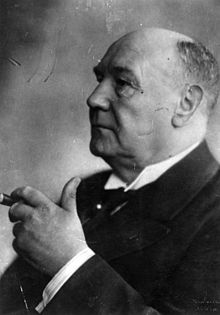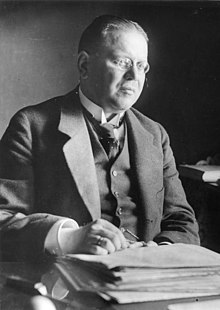German interracial marriage debate (1912)
The May 1912 Reichstag debate on interracial marriage was the most significant and explicit discussion of (colonial) racial biopolitics on a national level in the German Empire before World War I.
On 17 January 1912, the Reich Colonial Office led by State Secretary Wilhelm Solf enforced a distinction between legitimate and illegitimate mixed-race children for Samoa, on top of the previous marriage ban.
In March 1912 in the Reich Budget Commission for the Colonies, the Social Democrats requested the legalisation of mixed marriages and the right to alimony also for extramarital children.
Concurrently, a resolution was put before the Federal Council to draw up a law restricting the colonies' ability for ordinances and extending the Reichstag's influence there.
In the 53rd meeting of the Reichstag's 13th session, on 2 May 1912, State Secretary for the Colonies Wilhelm Solf initiated a fundamental debate on the mixed-race question and the problem of mixed marriages, depicting it in dramatic terms.
[2] He argued, the "vicious consequences of mixed marriages" to be recognised by all nations whose "calling for colonisation brought them in touch with coloured peoples of low culture and inferior civilisation."
The Social Democrat accused Solf of the fear that "the influx of white blood" into Samoa would give rise to "a part-white, part-Samoan population, like the Basters of South West Africa who descended from Dutchmen and Hottentots", which would strengthen the natives' ability to resist.
The liberal deputy Carl Braband (Free-minded People's Party) similarly criticised during the debate[4] that at the occasion of "displays of exotic troupes of Nubians, Negroes and Singhalese", "white women almost threw themselves at the foreign guests."
Braband rejected mixed-marriages and the resulting children as a plainly pathological phenomenon and advocated at the same time for the "prevention" of "marriage between persons with severe infectious or hereditary diseases."
Johannes Zürn, a Protestant pastor of the German Reich Party, put forward the hypothesis that "children arising from mixed marriages [develop] towards the bad side."
"[6] Karl von Böhlendorff-Kölpin (German Conservative Party) demanded a "sharp segregation" of the races and "educating our colonial citizens" against mixed marriages and cohabitation.
Reinhard Mumm, a Christian Socialist of the Economic Union,[7] criticised that "a certain female lowlife" in the big cities "associates with Black men" and demanded as the "sharpest reaction" enshrining the rejection of such "racial defilement" in "the people's consciousness."
At the end of its debate, the Reichstag passed a resolution on 8 May 1912 that asked the government to draw up a law to "ensure the validity of marriages between whites and natives in all German colonies" and to determine the rights of illegitimate children.




